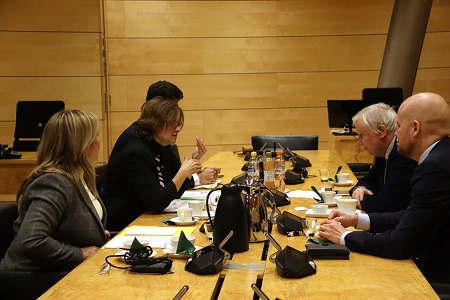- The Minister for Foreign Action and European Union is on a working trip to Helsinki, where she has met with the Finnish Minister for Social Affairs and Health, Hanna Sarkkinen, and former Prime Minister Jyrki Katainen

The Minister for Foreign Action and European Union, Meritxell Serret i Aleu, announced this Wednesday a 30% increase in the budget for development cooperation in the draft budget for 2023. This is an increase that triples that initially foreseen in the preliminary draft of the Government budget. Serret made this announcement as part of her working trip to Finland, where until tomorrow she will be holding meetings with representatives of various institutions, as she has already done this morning with the Minister for Social Affairs and Health, Hanna Sarkkinen, the former Prime Minister and former European Commissioner Jyrki Katainen, and members of the Finnish Parliament's Foreign Affairs Committee. During these meetings, Serret expressed her interest in the priorities of Finland’s cooperation policy, which she described as a “benchmark”, and informed the Finnish authorities of “Catalonia's historic commitment to this policy, endorsed by the majority of citizens”.
Speaking to the media in the Finnish capital, Serret pointed out that this increase in the draft budget “brings us closer to the record contribution that was made 15 years ago, and it reinforces the commitment of this government and Catalan society to reach the target of 0.7%”. In total, the Catalan Agency for Development Cooperation's budget will increase by 10.5 million euros to 45 million euros. Minister Serret added that “there is still a long way to go” towards 0.7% and, for this reason, “we are constantly working together with organisations to find a way to consolidate our commitment to reach this financing target”. Finland is one of the EU countries that is moving decisively towards the official development aid target of 0.7% of GDP, currently devoting 0.5%, a figure that makes the Nordic country the tenth largest donor in the world.
Meeting with former Finnish Prime Minister
In the morning, after presenting the Catalan pilot plan for universal basic income to the Finnish Minister of Social Affairs and Health, Hanna Sarkkinen, the Minister Meritxell Serret met with former Prime Minister and former European Commissioner Jyrki Katainen. Katainen, who led the Finnish government between 2011 and 2014 and was Vice-President of the European Commission between 2014 and 2019, currently heads Sitra, a think-tank promoting the transition to a circular economy. During the meeting, the Minister and the former Prime Minister shared their view on the need to continue supporting the European Union's response to Russia's aggression against Ukraine. They also discussed areas in which both Catalonia and Finland have strategic projects. Examples of this are public policies in the service of common challenges such as biodiversity and the climate emergency, or the commitment to H2Med.
Earlier today, Minister Serret also visited the Finnish Parliament, where she met with Erkki Tuomioja, Vice-Chair of the parliament's Foreign Affairs Committee and Jussi Saramo, member of the Committee, through whom she was able to learn first-hand how they are experiencing the conflict in Ukraine and its consequences. In the Finnish capital, Serret also met with Markku Markkula, President of the Helsinki-Uusimaa Regional Council, Finland's most populous and dynamic region. Markkula is also a member of the Committee of the Regions, which he chaired between 2015 and 2017. “We have been able to strengthen relations with the Helsinki region and we will be able to establish good cooperation in the challenges we have in common, such as the climate crisis and the energy transition, which will mark the future of our economies”, said the Minister. Like Catalonia, the Helsinki-Uusimaa region has been a member ofRegions for EU Recoverysince April 2021. This initiative brings together more than 30 European regions calling for a more active role in the management of Next Generation EU funds.